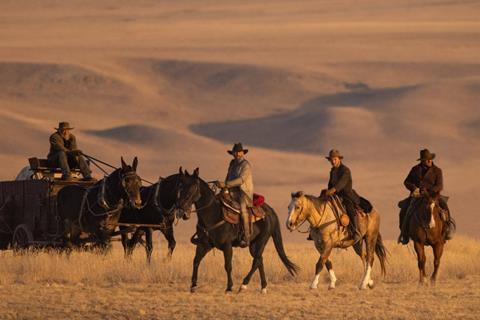Gabe Polsky’s adaptation of the John Williams novel features a committed Nicolas Cage traversing familiar Western territory

Dir: Gabe Polsky. US. 2022. 107mins
A sheltered college student seeking life experience gets more than he bargained for in Butcher’s Crossing, a grim portrait of men on the Western frontier during the 1870s engaged in a doomed buffalo hunt. Director Gabe Polsky’s adaptation of the John Williams novel makes good use of the rugged scenery, which is as pitiless as the adventure that awaits these cowboys who leave civilisation behind; practically returning to a primal state in the process. But despite Nicolas Cage’s committed performance as the imposing, hardheaded leader of the expedition, this mournful yarn can’t quite transcend what’s familiar about its study of masculinity and the unforgiving spirit of the natural world.
Tells us dark but not altogether new truths about the brutality that went into how the American West was won
Screening at the Toronto Film Festival, Butcher’s Crossing is best described as an existential western, one in which action takes a backseat to a close examination of human behaviour — specifically, men’s desire to conquer and destroy. Cage is largely reserved, however, so fans who relish his more outrageous turns may be disappointed. But anyone looking for a film sporting an unromantic vision of the Old West has come to the right place.
Kansas, 1874, and Harvard man Will (Fred Hechinger) has dropped out of school and headed west, deciding he needs a taste of the real world. He quickly introduces himself to Miller (Cage), a surly, seasoned buffalo hunter, who takes him out to the Colorado Territory — along with Miller’s compatriots, the disagreeable Fred (Jeremy Bobb) and God-fearing Charlie (Xander Berkeley) — to track down an elusive herd whose hides will fetch a pretty penny. But the longer they’re away, the more obsessive Miller gets about eliminating the entire herd, unwisely extending their stay into winter, when deadly snowstorms threaten the expedition.
Polsky, perhaps best known for the hockey-themed documentaries Red Army and Red Penguins, pursues an elemental story about hubris, testosterone and madness, with Leo Birenberg’s flinty score underlining the tale’s spare, dour inevitability. When we first meet Will, we see a naive, fresh-faced young man hungering for the raw, untamed aspects of life. Once he encounters Miller — unsmiling, bald-headed, sporting a thick beard — there’s little doubt Will will be cursed to have his wish granted.
Shot in Montana on land owned by the Blackfeet Nation, information pointed out in the end credits, Butcher’s Crossing is visually gorgeous, creating a sense that these four men are cut off from the world — and, eventually, their own humanity – after they become snowed in, their way home blocked by the punishing wintry weather. But the film’s dim view of aggressive masculinity is amplified by its unsparing depiction of Miller and his team’s slaughtering of the buffalo, these magnificent creatures mowed down by the men’s guns. (The animals used in the film come courtesy of the Blackfeet Tribe Buffalo Program, which seeks to bolster their numbers after the bison population in the area was nearly wiped out in the 1880s due to excessive hunting by outsiders.) Butcher’s Crossing sees these cowboys as nothing more than invaders, subtly suggesting that their fate is a cosmic punishment for their greed.
But while its thoughtful tone and David Gallego’s beautiful lensing are obvious strengths, the picture struggles to find fresh insights about its thematic concerns. The slow buildup of tensions between the men is fairly predictable and not especially illuminating — and when they’re later trapped in the snow, the payoff isn’t all that surprising or riveting. Even Will’s coming of age plays out fairly predictably, with Hechinger trying his best to lend the character a bitter wisdom as his illusions about the West are stripped away.
Although it’s rare (and welcome) that Cage is this muted, he remains such a volatile onscreen presence that he doesn’t feel completely believable in this period role. With his electric eyes and intense demeanour, there’s something a little too contemporary about his very being — a fact not helped by Cage’s occasional clear homages to Marlon Brando’s similarly unhinged bald leader Kurtz in Apocalypse Now.
As the situation grows more desperate and Miller’s refusal to heed his comrades’ advice becomes more troubling, Butcher’s Crossing doesn’t fully capitalise on the realisation that Will is marooned in the middle of nowhere with a dangerously unstable individual — that Miller, the polar opposite of the more refined Will, represents the ugliest, most feral aspects of man. Like the film itself, Miller is telling us dark but not altogether new truths about the brutality that went into how the American West was won.
Production companies: Gabe Polsky Productions, Altitude Films Entertainment, Phiphen Pictures
International sales: Altitude Films Sales, info@altitudefilment.com
Producers: Will Clarke, Andy Mayson, Molly Conners, Amanda Bowers, Gabe Polsky
Screenplay: Gabe Polsky & Liam Satre Meloy, based on the book Butcher’s Crossing by John Williams
Cinematography: David Gallego
Production design: Tessla Hastings
Editing: Nick Pezzillo
Music: Leo Birenberg
Main cast: Nicolas Cage, Fred Hechinger, Xander Berkeley, Rachel Keller, Jeremy Bobb, Paul Raci






![The Brightest SunScreen[Courtesy HKIFF]](https://d1nslcd7m2225b.cloudfront.net/Pictures/274x183/3/5/0/1448350_thebrightestsunscreencourtesyhkiff_312678.jpg)















![The Brightest SunScreen[Courtesy HKIFF]](https://d1nslcd7m2225b.cloudfront.net/Pictures/100x67/3/5/0/1448350_thebrightestsunscreencourtesyhkiff_312678.jpg)

